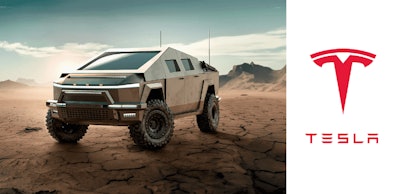
Toronto, Ontario — In this weekly electric and autonomous vehicle report, Archimedes Defense has announced upgrades to Tesla’s Cybertruck intended to make it “apocalypse ready”; while the United Kingdom has deemed that drivers are “not liable” in the event of an autonomous vehicle crash.
Fortifying the frunk
Last Friday, Archimedes Defense, a defence contractor and a division of Tesla tuning house Unplugged Performance announced an “apocalypse ready” package for the Cybertruck designed to allow the vehicle to allegedly “go anywhere.”
The upgrades are aimed at government and defence applications and include features such as a satellite receiver mounted in the electric truck’s bed, an AMP Drive G125 800-volt generator mounted in the frunk and a bolt-on off-set steel armour plating.
The AMP Drive generator reportedly runs on jet fuel, JP-8, diesel and biodiesel. Similarly, the bolt-on steel armour plating is reportedly capable of withstanding a 7.62 mm assault rifle.
While the upgrades are designed with military connotations, Tesla noted that civilians can also order the features.
In its Friday announcement, Archimedes said it would take pre-orders for the upgraded Cybertrucks, but no prices for the features were announced.
Lacking liability
Automotive risk intelligence company Thatcham Research in the United Kingdom has confirmed that drivers in the country will “not be held liable” if a driverless car crashes with them at the wheel.
Yousif Al-Ani, principal ADAS engineer at Thatcham Research told Express.co.uk that “this capability means that when the system is active, the driver is no longer responsible for the driving task, and instead, this responsibility lies with the vehicle manufacturer. It is crucial that government enables open and robust access to data in the event of a collision via subsequent secondary legislation.”
Al-Ani further commented to Express.co.uk that “this data access will be key in establishing who was in control in the event of an incident, and thus which party is liable for the operation of the vehicle.”
As a result, on May 20, 2024, the U.K. published the Autonomous Vehicle Act, which seeks to address the complexities and potential legal ambiguities associated with the use of autonomous vehicles, aiming to ensure safety, accountability and public trust in the emerging technology.
The Act specifically notes that “the liability for incidents involving autonomous vehicles predominantly shifts from the individual “driver/operator,” or what the Act defines as “user-in-charge,” to the manufacturers and operators of the autonomous systems. This shift reflects the reality that in a fully autonomous vehicle, the human occupant is not in control of the vehicle’s operations.”
Al-Ani concluded that “this data access [in response to the Act] will be key in establishing who was in control in the event of an incident, and thus, which party is liable for the operation of the vehicle.”






















